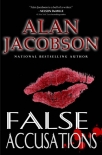False Accusations Jacobson, Alan (books successful people read .TXT) 📖

Book online «False Accusations Jacobson, Alan (books successful people read .TXT) 📖». Author Jacobson, Alan
He stood up to stretch and invigorate his tired limbs, then called Johnny Donnelly to inquire about his success in locating the checkout clerk.
“Old Ronald’s proving a bit hard to find, even for a snoop like me, Junior.”
“What have you got?” he asked, stifling another yawn.
“Checked DMV. Nothing. He ain’t applied for a license.”
“Probably just using his California license. Checked the post office, no one seen him come by his box. Mailed him a note to call me, told him there was a reward. Didn’t say how much. I’ll give him a five spot if he presses me on it. You’ll owe me five, Junior.”
Chandler laughed. “What about parents, anyone else by his name in town or the surrounding areas?”
“No one. If he’s got family, they got a different last name. Could sure use a picture of the guy though.”
“Wish I had one, but I don’t. What about the unemployment agency, state disability, local hospitals?”
“That’s on the plate for tomorrow. You know me, Junior. I’m up till four in the morning, but nobody else seems to like that schedule.”
Chandler told him he would call tomorrow when he returned to New York; he gathered up his suitcase and got ready to leave for the airport.
Madison watched the copy of the Stanton video with Leeza that evening once the boys had been put to bed.
“Just what the doctor ordered,” she said.
Madison nodded absentmindedly, the pun lost on him. “It’ll probably be inadmissible in court, and the bogus evidence against me will still be hanging over my head. Not to mention all the legal hurdles we need to overcome and the fact that my practice is a shambles. But in spite of all that...I feel good.”
“You needed the emotional lift,” she said, resting in his arms and running her fingers through his hair.
“What matters to me most, Lee, is that we’re together. Not just physically, but emotionally. It’s hard to believe it took such an incredible run of events to show me what we’ve been missing the past few years.”
“Better that you realized it now, rather than years down the line. It’s not too late to make changes.”
Madison sighed. “Whether or not it’s too late remains to be seen.”
CHAPTER 50
MANHATTAN WAS ONE OF THOSE places that, with rare exception, was considerably less attractive following a snowstorm. Unlike the Sierra or the Andes Mountains, where the snow accentuated the natural beauty of the surroundings, snow in Manhattan quickly turned to gray and black slush, with some yellow sprinkled in here and there from a dog whose bladder needed relief.
On most of the busiest side streets, mounds of snow lay piled against the curb, the result of a snowplow’s pass earlier that morning. Those people whose cars were parked at the curb would find an unanticipated wall of hard-packed snow holding their vehicles prisoner. The sight of angry businessmen and -women in suits heaving the frozen white stuff away from their cars with folding shovels at the end of a long workday was not an unusual one in certain parts of the city. Those who were fortunate to be able to commute by subway, bus, or cab enjoyed a definite advantage.
As the cars swished by on the densely trafficked venues, a light rain fell. In the past, whenever the temperature fell into the teens, thin sheets of ice coated the sidewalks—and caused an unusually high number of people to report to emergency rooms or chiropractic offices with slip-and-fall injuries.
This morning, Denise had taken Noah to day care. She and Chandler made plans to meet for brunch at ten o’clock to give him time to check in at the office and deal with the imminent tongue-lashing he was likely to receive from Hennessy.
“I hate driving in the city,” Chandler said to the Iranian man who was weaving in and out of traffic with the reckless abandon of a seasoned New York City cabbie. “It’s like a war fought without guns. People use their cars to take out their aggression.”
The taxi driver, periodically launching into a barrage of vile language aimed at certain vehicles he cut off en route to his destination, curtailed the expletives long enough to agree with his passenger. “I consider myself a soldier, a soldier who wins most of his battles. That is why I get you where you want to go on time,” he said, pulling up at the Police Academy building on East 20th Street.
After he paid the man and exited the cab, Chandler ascended the slush-covered steps of the square, gray-brick building that had been built in the 1970s. He paused at the doorway and filled his lungs with cold air. It felt good to be home again, on his own turf.
Inside, he walked across the slate entryway, glancing over at the glass-enclosed academy gymnasium. He flashed on his days in training, when he was young and eager to graduate and become a beat cop. That was before he moved to California to put distance between himself and his father. He shook his head at the irony that left him showing up on his dad’s doorstep nearly ten years later, disabled and without a job.
He took the elevator to the eighth floor and waved at Nick in the evidence lab. Nick gestured for him to come answer a question. Shouting that he would be hack in a little while, Chandler proceeded down the hall and stopped outside the door of his boss. “Capt. James Hennessy” was lettered in black on the dimpled glass. He grabbed the dented brass knob, twisted it, and





Comments (0)